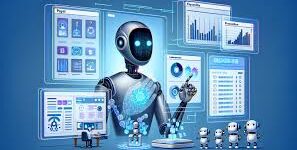In recent years, we have witnessed a remarkable revolution in the world of technology. One of the most influential and transformative forces in this domain has been Artificial Intelligence (AI). AI is not just a buzzword; it is a game-changer that has revolutionized various industries. From healthcare to finance, from manufacturing to marketing, AI’s impact is ubiquitous and profound. In this article, we will explore the power of AI in transforming industries, shedding light on its various applications and discussing the potential it holds for the future.
Understanding Artificial Intelligence
Before we dive into AI’s applications, it is crucial to understand what AI actually is. In simple terms, AI refers to the simulation of human intelligence in machines that are programmed to think, learn, and problem-solve like humans. It enables computers to perform tasks that typically require human intelligence, such as visual perception, speech recognition, decision-making, and language translation.
The Growth of AI Across Industries
- AI in Healthcare: Revolutionizing Patient CareAI has made significant inroads in the healthcare sector, revolutionizing patient care and diagnostics. Medical professionals can now leverage AI algorithms to analyze vast amounts of patient data, leading to faster and more accurate diagnoses. AI-powered robots are also assisting in surgeries, minimizing risks and enhancing surgical precision.
- AI in Finance: Enhancing Efficiency and Risk ManagementFinancial institutions are increasingly adopting AI to streamline processes, detect fraud, and personalize customer experiences. AI-powered chatbots and virtual assistants are providing round-the-clock customer support, while predictive analytics is helping in making data-driven investment decisions.
- AI in Manufacturing: Optimizing Production and Quality ControlIn the manufacturing sector, AI-driven automation is improving production efficiency and reducing costs. AI-powered machines can detect defects in real-time, ensuring high-quality products. Moreover, predictive maintenance helps in minimizing downtime and maximizing productivity.
- AI in Marketing: Personalization and Customer EngagementAI has transformed the way companies approach marketing. By analyzing customer data, AI can provide personalized recommendations, targeted advertisements, and optimized pricing strategies. Additionally, AI-powered sentiment analysis helps brands gauge customer feedback and sentiment.
Challenges and Concerns
While AI’s potential is vast, it also brings forth some challenges and concerns.
- Data Privacy and SecurityWith the integration of AI in various industries, there is an increased need to handle vast amounts of sensitive data. This raises concerns about data privacy and security breaches. Companies must prioritize robust data protection measures to maintain trust with their customers.
- Job Disruption and ReskillingThe widespread adoption of AI may lead to job displacement in certain sectors. However, it also opens up new opportunities for skill development and reskilling. Governments and organizations must invest in programs to help the workforce adapt to the changing job landscape.
- Algorithm Bias and FairnessAI algorithms are only as good as the data they are trained on. If the training data is biased, the AI system may perpetuate discriminatory outcomes. It is crucial to address algorithm bias and ensure fairness and inclusivity in AI applications.
The Future of AI: Unleashing its Full Potential
Despite the challenges, the future of AI holds immense promise. Here are some exciting possibilities:
- AI and Internet of Things (IoT) IntegrationThe integration of AI with the Internet of Things will create a network of interconnected smart devices, making our homes, cities, and industries smarter and more efficient.
- AI in Education: Personalized LearningAI will revolutionize education by offering personalized learning experiences tailored to individual student needs and learning styles.
- AI in Climate Change MitigationAI can play a crucial role in monitoring environmental data, predicting climate patterns, and optimizing energy consumption, contributing to global efforts in climate change mitigation.
Conclusion
Artificial Intelligence has emerged as a transformative force that is reshaping industries and revolutionizing the way we live and work. Its applications span across various sectors, from healthcare to finance, from manufacturing to marketing. While challenges like data privacy and job disruption exist, the potential benefits of AI far outweigh the concerns. As we move into the future, harnessing AI’s full potential will require collaborative efforts from governments, businesses, and society to ensure that it is used responsibly and ethically. Embracing AI with a human-centric approach will unlock unprecedented opportunities and drive us towards a brighter and more innovative future.










